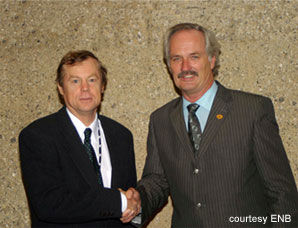|
For use of the media only;
not an official document.
PRESS RELEASE
FAO-CITES agreement promotes sustainable fish trade
Collaborative relationship formalized in MoU
3 October 2006, Geneva/Rome – What do seahorses, whale sharks and Caribbean queen conches have in common?
 All three are species whose international trade is regulated by the Convention on International Trade in Endangered Species of Wild Fauna and Flora (CITES). They are also commercially exploited aquatic species whose good management falls within the purview of the Food and Agriculture Organization of the UN (FAO). All three are species whose international trade is regulated by the Convention on International Trade in Endangered Species of Wild Fauna and Flora (CITES). They are also commercially exploited aquatic species whose good management falls within the purview of the Food and Agriculture Organization of the UN (FAO).
Seahorses are valued worldwide as ornamental fish for display in aquariums and in Asia as an ingredient in traditional medicine. Demand for whale shark fins and for the tender meat of queen conches is also high. In some places this has led to over-harvesting and concerns about the survival of the populations, so the international community has agreed to regulate their trade under CITES.
This means that a country that wishes to export live or dead seahorses, whale sharks or queen conches must first certify through CITES that they were legally harvested and that their trade will not be detrimental to the survival of the species in the wild.
Including a species in CITES, though, is only a start. Just as important is making sure that controls for enforcing the listing are effectively implemented by all trading countries.
This is frequently a problem. In the case of the queen conch, for instance, listing the species in CITES Appendix II did not halt over-fishing, and concerns about the species have continued.
CITES therefore teamed up with fisheries experts at FAO and with authorities in exporting countries in an effort to gauge the state of wild conch stocks, assess management practices more effectively, and ensure that only responsibly managed fisheries were participating in international trade. Doing so has made it easier for CITES to assess accurately where there is a problem and to help countries put controls in place as needed.
This cooperation is helping to ensure that this valuable resource is used sustainably.
Building on this encouraging example, FAO and CITES are now also working together on other listed fish species (such as giant clams, sturgeon and humphead wrasse) as well as others that are being considered for a CITES listing, including sea cucumbers and several shark species.
Formal agreement cements working relationship
CITES and FAO have now formalized their working relationship in a Memorandum of Understanding (MoU) signed today by CITES Secretary-General Willem Wijnstekers and FAO Assistant Director-General for Fisheries Ichiro Nomura.
Under the MoU, FAO and CITES will review and consult together on the scientific, legal and technical evaluation of commercially exploited aquatic species listed or proposed for listing in the CITES Appendices.
For species that are already listed or set to become so, FAO will work with CITES and exporting countries to improve the monitoring and management of fisheries resources and help them ensure that exports only come from responsibly managed operations. FAO will also organize workshops and other activities to help national authorities strengthen fishery management across the board.
“This MoU provides a new opportunity for FAO to deploy our expertise in fisheries biology and policy in a very practical, concrete way,” said Mr. Nomura. “In working with CITES to promote and encourage sustainable fisheries and responsible fish trade in those cases where international trade has led to serious conservation concerns, we hope to add to our efforts to make sure that people round the world can continue to feed themselves and earn their incomes from fisheries and trading fish products, indefinitely.”
According to Mr. Wijnstekers, "CITES and FAO have a long history of technical cooperation, and the new MoU gives us a solid basis for making that cooperation more robust at the national and international levels. It allows us to achieve more together than we have been able to achieve separately in the management and conservation of aquatic resources by combining the regulatory measures of CITES with the technical expertise of FAO.”
The value of the international trade in fish products recently reached a record high of USD$71 billion, according to FAO statistics. While this trade often strengthens food security and improves incomes in developing nations, both CITES and FAO have called on fishing nations to be wary that it does not harm wild stocks.
For more information please contact:
George Kourous
Media Relations, FAO
george.kourous@fao.org
(+39) 06 570 53168
(+39) 348 141 6802
Juan Carlos Vasquez
Legal Affairs Officer, CITES
juan.vasquez@cites.org
(+41) 22 917 8156
 To read previous press releases, go to Archives. To read previous press releases, go to Archives.
|